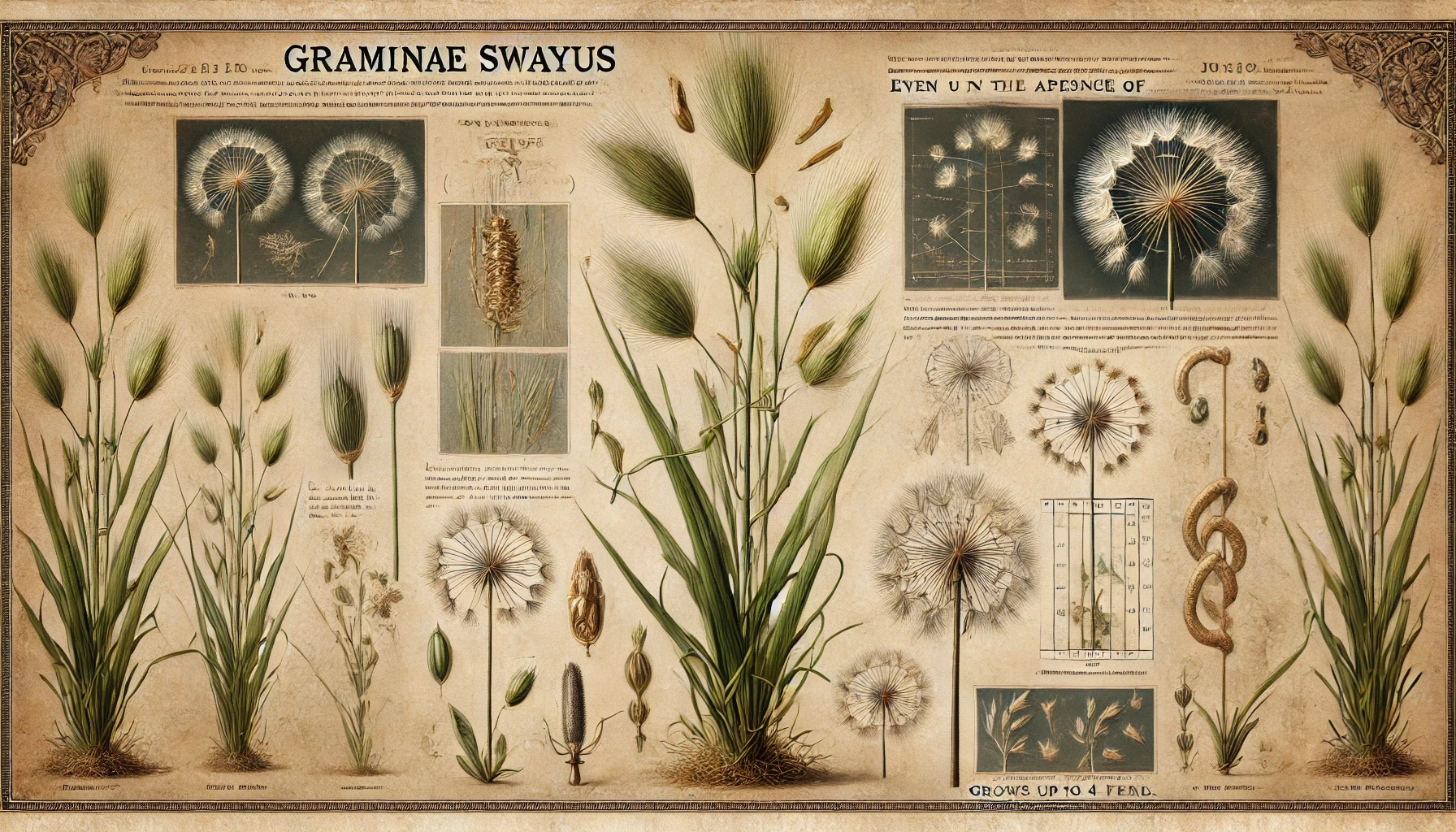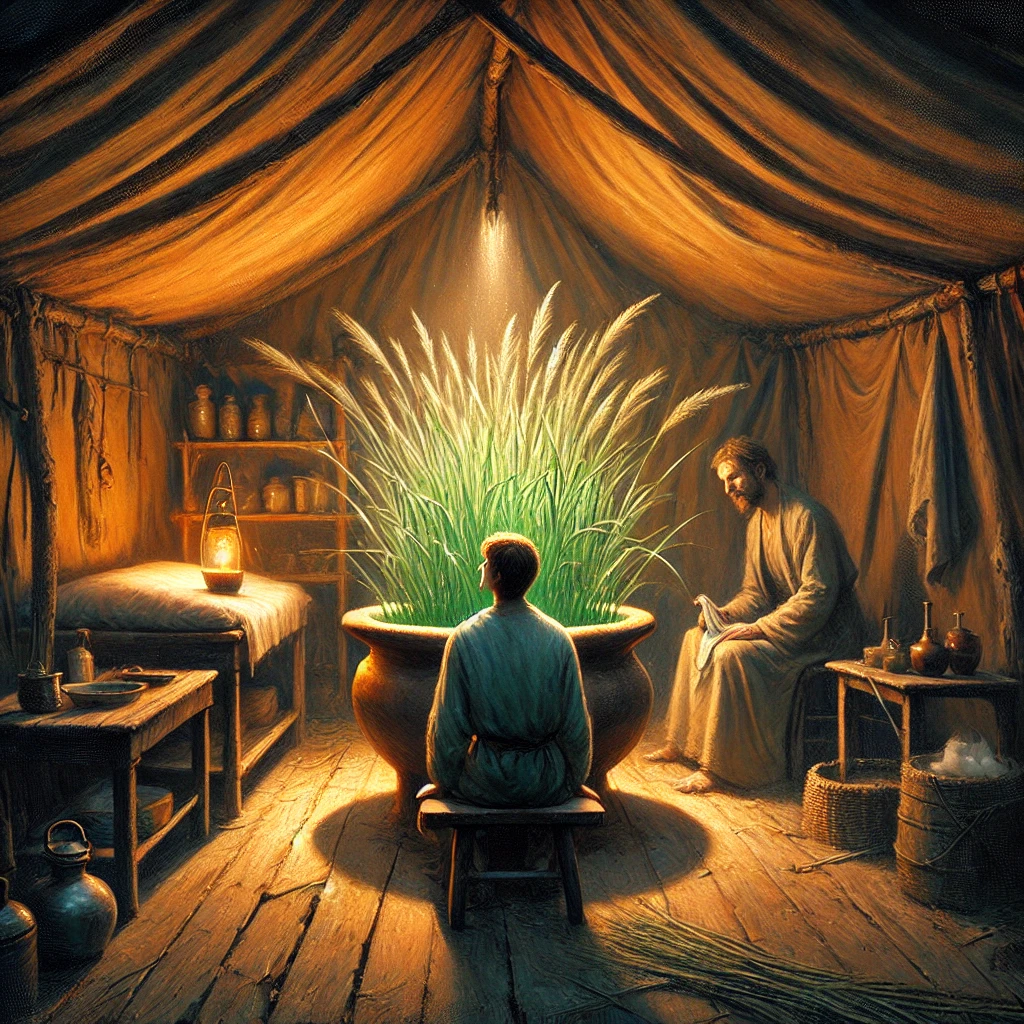Visual Description
Swaystem Grass is a tall, elegant grass species with long, narrow leaves and thin, pliant stems. At first glance it resembles any common field grass—until it begins to move. Even in still air, its blades sway in smooth unison, responding not to the wind, but to the approach of nearby creatures. The effect is often mesmerizing, especially as the seed heads glow faintly, appearing like a field of soft, golden lanterns floating just above the ground. At night, this glow becomes more pronounced, and travelers report the unsettling sense that the grass is “watching,” or even leading them somewhere.Habitat and Growth
Swaystem thrives in open grasslands with broad skies and minimal tree cover. It grows in shallow-rooted colonies that slowly spread over years, occupying areas where animals often pass. The plant has developed a unique strategy for dispersal: when disturbed, it releases mildly hallucinogenic spores that influence grazing animals and small predators, subtly compelling them to transport seed clumps in fur or waste to distant locations. These spores are harmless in small doses, but repeated exposure may induce confusion, dreamlike awareness, or emotional suggestibility.Alchemical Use and Preparation
The grass’s seed heads are collected during the full moon, when their chemical potency peaks. When brewed into a potion, the seeds produce a temporary softening of mental defenses, making the drinker more open to suggestion, particularly in emotionally charged situations. This effect is not overt domination, but rather a subtle realignment of perception—making arguments seem more reasonable, commands more acceptable, and suggestions feel like natural conclusions. Proper storage is essential: the seeds must remain aerated and dry, lest they spoil and lose their effect entirely.Warnings and Curiosities
Spending prolonged time among dense patches of Swaystem—especially while fatigued—can cause subjects to enter a trance-like state, their breathing slowed, movement dulled. In extreme cases, this leads to temporary paralysis, as if the body forgets how to move. The condition, known as “Greenstill,” wears off gradually but can be dangerous in wild terrain. The plant is often mistaken for Goldenrod Grass, but the latter lacks the glowing seed heads and coordinated motion.Historical Notes and Folklore
In ancient times, shamans of the plains would lie in fields of Swaystem Grass under a full moon to commune with unseen spirits. Whether real or symbolic, the sway was believed to mimic the breathing of the spirit world—and by matching it, a shaman could “inhale the voice of something older than language.” Some communities still plant Swaystem around sacred sites to mark the boundary between ordinary land and places “that listen back.” In more recent folklore, children are warned:“If you follow the lantern grass too long, you might forget where your legs begin.”
“It’s easy to call it calming. Easier still to call it useful. But we should be honest: Swaystem doesn’t soothe—it suppresses. There’s a difference.”
The Stillness Ward
In many remote settlements and on prolonged expeditions, where sedatives are scarce and magical healers rare, Greenstill procedures have become a quietly accepted practice—particularly for emergency amputations or treatments involving severe infection and rot. If a patch of mature Swaystem Grass can be found nearby the patient is seated before it, eyes fixed on the slow, rhythmic swaying. Elders trained in the rhythm murmur soft, metronomic instructions while heating blades and preparing straps. Within minutes, the subject’s breathing slows. Their gaze fixes. Their limbs slacken. Speech fades. They become still—too calm, some say—but fully cooperative. That is when the procedure begins.“It isn’t painless, but in the sway, they don’t flinch. They don’t fight the saving of their own life.A narrow margin separates benefit from danger. Watch too long, and the patient may remain frozen for hours, caught in the sway’s echo. Still, many healers keep a clutch of Swaystem seeds nearby—a last resort for when urgency outpaces comfort.



Comments